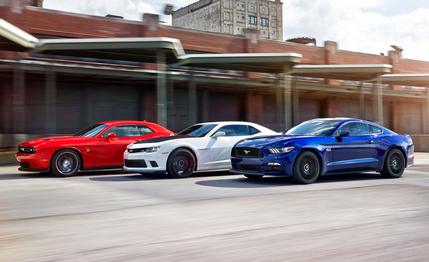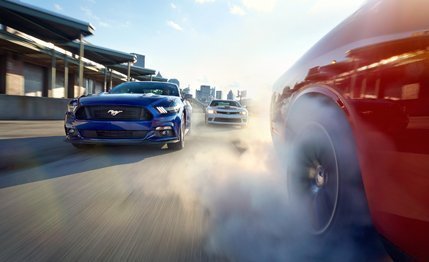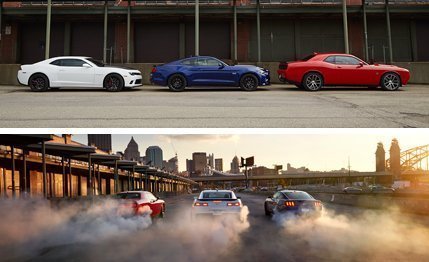 Comparison Tests
Comparison Tests
It’s hard to reconcile the 2015 Ford Mustang and its competitors with the city in which muscle cars were born. While decaying Detroit slogs through bankruptcy proceedings, still shrugging off the millstones of its past and working hard to get up and running again, the Ford is fully transformed into something sleek and modern. Meanwhile, its two direct and highly successful foes have recently been freshened with changes of their own.
The new sixth-generation Mustang finally gets an independent rear suspension, a mainstream-Mustang first and the equivalent of Detroit hosting the Olympics. That’s matched by a redesigned front suspension supported by a lighter, stiffer subframe. Nestled in that subframe, the 5.0-liter V-8 straps on a new intake manifold, heads, and valvetrain, raising output from last year’s 420 horsepower and 390 pound-feet to 435 and 400, respectively. The car’s basic profile is familiar, but at anything closer than field-artillery range, the stretched proportions and tauter skin are unmistakable. The rear haunches sit wider than before and are crowned with sharper creases; the view from the front is all fangs and sinew; and the body sides are sucked in, giving the impression of a narrower car though it’s actually 1.5 inches wider.

Pricing for the V-8 GT starts at $32,925, but with a list of options that includes the Performance package’s suspension upgrades and adaptive cruise control, ours climbed to a somewhat Germanic $45,885.
It’s nowhere near as thorough a rework, but the 2015 Dodge Challenger greets the redesigned Mustang with some cosmetic surgery of its own, including a new nose and rear fascia. Dodge continues to vigorously plunder its past with the new R/T Scat Pack, which takes its name from a 1968-71 Dodge marketing program and takes its engine from the modern-day SRT. The 6.4-liter’s output creeps up to 485 horsepower and 475 pound-feet of torque, embarrassing the outputs of the Mustang and Camaro. The Scat Pack also upgrades the brakes and includes the Challenger’s new Super Track Pak, which lowers the suspension a half-inch and fits Bilstein shocks and larger anti-roll bars. Think of the Scat Pack as an SRT without the badges and for $7500 less. At $39,490, our base Scat Pack was both the cheapest and the most powerful car in this test.

A whole year has passed since the Chevrolet Camaro got its new head- and taillights, but it’s not yet wearing grooves in the porch with its rocking chair. The 426-hp SS 1LE is more or less a ZL1 without the supercharger. It pilfers a bunch of suspension parts, a strut-tower brace, close-ratio transmission with a cooler, and a high-pressure fuel system from the ZL1. With Recaros lifted from the Z/28, a boisterous dual-mode exhaust, and a few other extras, the Camaro tallies at $41,880.
If not Detroit, then where do cars like these belong? To test their high-tension suspensions, we set a course four and a half hours southeast to Pittsburgh and the Allegheny foothills. Just as many of Detroit’s assembly lines have slowed and stopped, the fires died one by one in Steel City’s mills, too. But today, Pittsburgh thrives as an Appalachian Silicon Valley, drawing the likes of Apple and Google and consistently ranking among the best cities in America for just about anything—starting a business, raising a family, or drunkenly brawling at football tailgates. And had Henry Ford settled in these hills instead of the flatlands of Detroit, an American car that handles might not be such an anomaly.